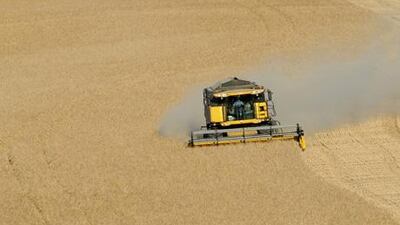LONDON // The world is hurtling towards a food crisis that could produce political instability across the globe, the head of the UN's food agency warned yesterday.
Calling for laws to curb speculation in surging commodity prices, Jacques Diouf, director general of the UN's Food and Agriculture Organisation, told the Nikkei business newspaper in Japan that governments had to "tackle the structural causes of imbalances in the international agricultural system".
Mr Diouf's remarks came a day after the French president, Nicolas Sarkozy, warned that the world risked food riots and weaker growth because of volatile food prices. This week two major international studies called for far-reaching action to feed a global population that is estimated to increase from 6.8 billion to 9.2 billion by 2050.
According to Mr Diouf, farm subsidies and tariffs are playing a major role in distorting the global balance between supply and demand.
In a report yesterday commissioned by the UK government and said to be the most comprehensive study ever undertaken into the future food market, scientists warned that there were major failings in the global food system that damaged the environment and left one billion people hungry.
The Global Food and Farming Futures study, based on contributions from more than 400 experts in 35 countries, said that, in real terms, the price of key crops would increase by between 50 and 100 per cent over the next 40 years.
It concluded that without major changes in agricultural production, including far greater use of controversial genetically modified crops, food production would not be able to keep pace with demand in the coming years.
"The global food system is living outside its means, consuming resources faster than they are naturally replenished," the report said. "It must be redesigned to bring sustainability centre stage. Substantial changes will be required throughout the food system and related areas, such as water use, energy use and addressing climate change."
Sir John Beddington, the UK government's chief scientific adviser, said at the launch of the study in London: "There's a very large risk of quite a substantial increase in food prices in the next 30 to 40 years.
"This risk is such it demands urgent action on all components of the food system - supply, demand and making the food system work more efficiently."
He said the current system of food production was "fundamentally unsustainable", overusing resources such as land and fossil fuels while failing to feed the world.
The report called for "sustainable intensification" of agriculture to produce more food from the land available without harming the environment.
Sir John said biotechnology, including genetically manufactured crops, would be "extremely important" along with such measures as improving farmers' skills, investing in scientific knowledge and improving infrastructure in the Third World to enable farmers to get their produce to market.
The report found that a third of food currently produced went to waste, either after it was harvested, particularly in the developing world, or by consumers, primarily in wealthy nations.
The UK report echoed a French study published a few days earlier. The Agrimonde project, conducted by two leading research institutes in France, concluded that nothing short of a food revolution was needed to avoid mass famine.
Patrick Caron, an Agrimonde co-author, said: "World agriculture lies at the heart of major worldwide challenges, and this report tells us why business as usual is not an option."
The UK and French studies found that a global population of more than nine billion could be fed as long as agricultural yields were boosted, waste was drastically reduced, and distribution improved.
In the wake of the French report and at the start of France's stewardship of the G20, Mr Sarkozy questioned why money markets were regulated but commodity markets were not.
He said: "If we don't do anything, we run the risk of food riots in the poorest countries and a very unfavourable effect on global economic growth. The day there are food riots, what country at the G20 table will say this does not concern them?"
But Mr Lang, head of the Centre for Food Policy at City University London, said that, while the focus of concern over food scarcity was usually on Africa, the western world's model of production and consumption was not sustainable either.
"We overconsume, pay too little, have heavy environmental footprints, and distort our health," he said. "Yet somehow the politicians and policymakers won't get a grip. They are frightened of unlocking us from an unsustainable system which celebrates cheap food by damaging people and the planet."

